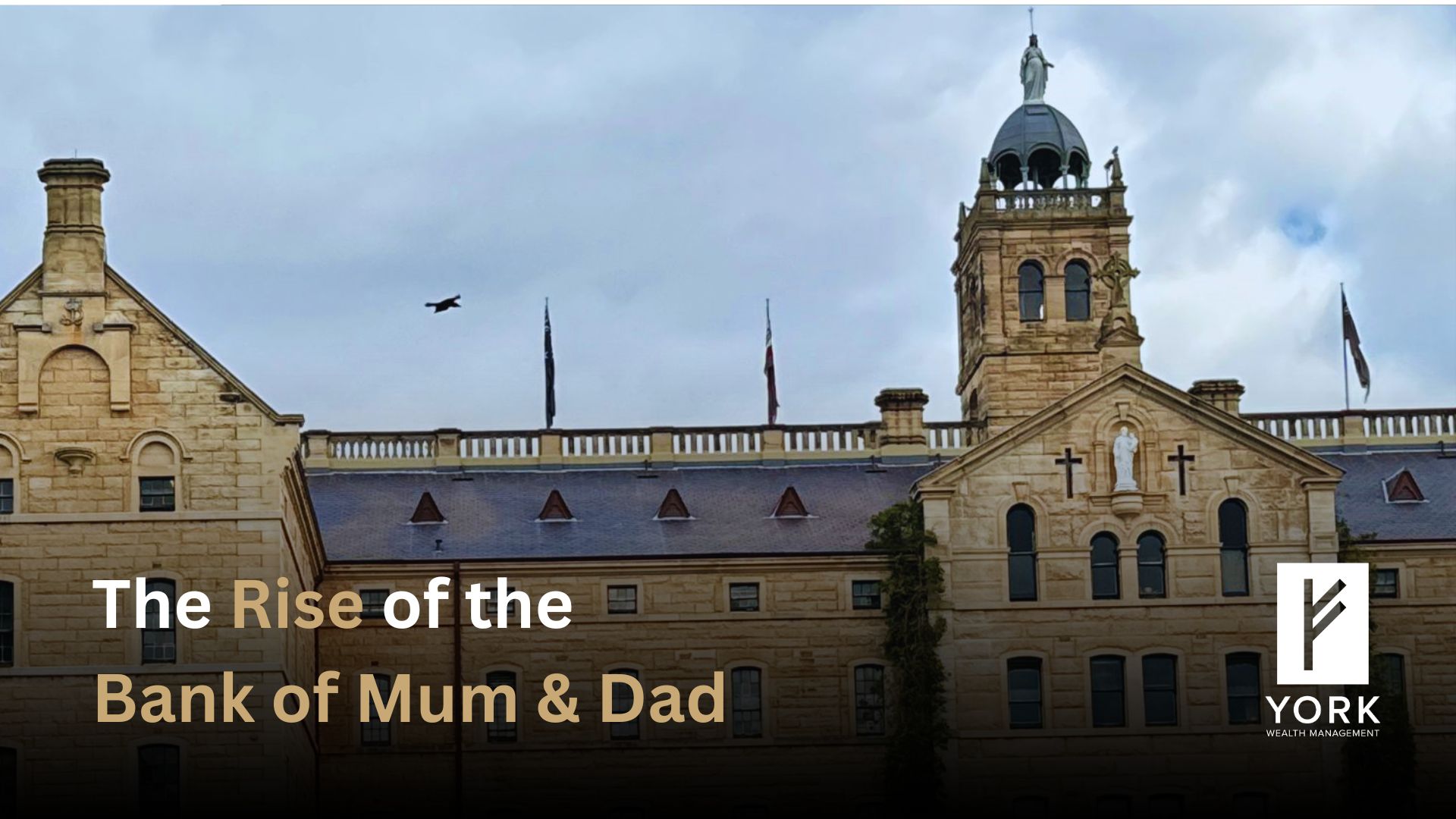The rise of the bank of mum & dad

The Rise of the Bank of Mum & Dad
In today's economic climate, the term "Bank of Mum & Dad" has become a crucial component of financial planning for many families. This phenomenon sees parents and grandparents providing significant financial support to younger generations, particularly in the context of purchasing property. As home-ownership becomes increasingly challenging due to soaring property prices and financial pressures, let's delve into the factors driving this trend, its implications, and whether it's a necessity or a choice in the modern world.
Personal Insights and Experience
I was fortunate enough to attend a great school St Joseph's College Hunters Hill (Joeys). Reflecting on my time at Joeys I recall how the fees for a Year 7 boarder were around $7,000 and $24,000 for Year 12 in 2004 and dad said to always add 25% for miscellaneous expenses. Currently, the annual fees for boarding students at Joeys are $59,853 and $42,732 for day students. During my 20-year reunion a few weeks ago, watching Joeys beat Riverview!!! It was striking to hear that about 50% of current students had their fees paid by their grandparents, highlighting the growing reliance on inter-generational financial support.
This really struck a cord with me and made me wonder about all the old boys there having there 5yr, 10yr, 20yr and 30 yr reunions. If we wanted to give our kids the same educational opportunity, what do the real numbers look like and is it even feasible for future generations without the bank of Mum and Dad?
The Economic Landscape
Rising Property Prices and Inflation
Property prices in Sydney, and particularly in Hunters Hill, have surged dramatically since 2004. For instance, median house prices have more than doubled, with an inflation of approximately 191.67% over the past two decades. In 2004, according to finder.com.au the median house price in Hunters Hill was around $1.2 million, while in 2024, it has soared to approximately $3.5 million. This significant increase reflects broader trends across Australia, where the average house price increased by 2.8% in March 2024 alone.
The rapid rise in property prices can be attributed to & not limited to several factors:
High Demand and Limited Supply: Urbanization and population growth in major cities like Sydney and Melbourne have increased demand for housing, while supply has not kept pace.
Low-Interest Rates: Historically low-interest rates have made borrowing cheaper, further fueling demand and driving up prices.
Foreign Investment: Inflows of foreign capital, particularly from investors looking for stable assets, have also contributed to rising property prices.
Covid-19 Impact: The economic response to the COVID-19 pandemic, including significant money printing and stimulus measures, resulted in one of the largest wealth transfers in history. While real wages increased only marginally, asset prices, including property, soared.
Inflation Beyond property
The inflationary pressures are not confined to the property market. Everyday expenses, such as groceries and utilities, have also seen significant increases. According to Canstar Blue, the average weekly grocery bill for Australian households was $160 in 2023, equating to approximately $8,320 per year. This is a significant increase from the average grocery spend in 2004, which was around $100 per week, or $5,200 per year, reflecting a 60% increase in grocery costs over two decades according to the Australian Bureau of Statistics.
However, this 60% increase might be an understatement. For instance, data from various sources indicate that prices for essential items have increased significantly. Between 2022 and 2023 alone, the prices of eggs rose by 10.7%, bread by 9%, and fish and seafood by 6.3% . The overall trend shows a significant rise in the cost of living, further underscoring the financial pressures on modern families.
The Extent of Financial Support
According to recent data, over 60% of first-home buyers in Australia receive financial assistance from their parents, with the average contribution being $33,278. This support can come in various forms, including direct cash gifts, loans, or acting as guarantors on mortgages. The "Bank of Mum & Dad" is now considered Australia's ninth-largest mortgage lender, collectively worth about $35 billion.
Psychological and Behavioral Implications
Gifting vs. Lending
Gifting: While gifting money can be a generous gesture, it may lead to feelings of dependency or indebtedness. During family gatherings, such as Christmas, the psychological impact of receiving a gift of this magnitude can create complex dynamics. Fathers, traditionally seen as providers, might feel their role is overshadowed. Moreover, a gift can sometimes create expectations or obligations that might affect family relationships.
Lending: Providing a loan encourages financial responsibility and discipline. However, it can introduce formal dynamics into family relationships, potentially causing stress or pressure for the borrower. A loan agreement, while fostering a sense of accountability, might also create tension if repayment terms are not clearly communicated and understood.
Practical Considerations
Real Inflation: Beyond property, real inflation affects everyday expenses such as groceries. The rising cost of living adds another layer of financial pressure on families, making external support crucial.
Bank Lending Practices: Banks increasingly require substantial assets or equity to back loans, making parental support essential for many aspiring homeowners. According to a 2023 report by APRA, over 70% of new home loans in Australia required a loan-to-value ratio (LVR) of 80% or less, emphasizing the need for significant deposits often supplemented by parental assistance.
The Big Question: Is There a Choice?
In today’s financial environment, the "Bank of Mum & Dad" has become almost indispensable for many families pursuing education, home ownership, or starting a business. Many parents are eager to help, but the challenge lies in doing so without disrupting family harmony. For some, the financial support is not just a choice but a necessity to bridge the gap created by economic pressures and high living costs.
Conclusion
The rise of the Bank of Mum & Dad reflects broader economic trends and the evolving nature of family support structures. As advisors, our role is to navigate these complexities, ensuring that financial assistance aligns with long-term family goals and maintains harmony. By understanding these dynamics, we can better guide our clients in making informed decisions that benefit all family members.
Until next time.

Follow The Rate Of Change to never miss a ROCast!
Article was originally written 18th July 2024.
5 topics
.png)
.png)